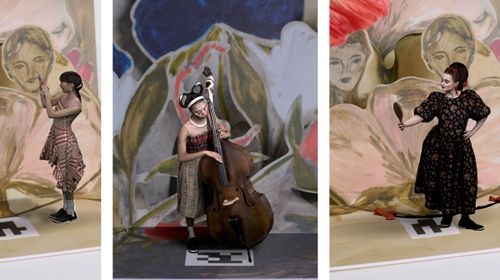
Studio: Spawning System
StudioThis project demonstrates how to dynamically spawn 3D entities using a custom component in Niantic Studio.
Spawning System Sample Project
This project demonstrates how to dynamically spawn 3D entities using a custom “spawner” component in Niantic Studio. You’ll learn how to:
- Automatically load and place multiple instances of a 3D model into the scene.
- Configure spawn settings such as entityAmount and spawnSpeed.
- Use simple ECS state machines to coordinate asset loading and event transitions.
Description
The Spawning System Sample showcases a “spawner” component that periodically creates new 3D entities (e.g., cows). Each spawned entity is given a model, basic animation, a collider, and a random position near the camera. This setup demonstrates how Niantic’s Entity Component System (ECS) can handle multiple objects’ creation and initial configuration on the fly.
Project Structure
Below is a brief overview of the key folders and files:
.
├── assets/ // Additional media assets (the cow.glb model)
├── spawner.ts // Main script defining the Spawner component
└── README.md // This README file
Key Files
-
- Defines the component, which controls how many entities to spawn, at what interval to spawn them, and how to position them.
- Uses a simple state machine to handle the “loading” phase (spawning entities) and a final “done” state once all objects are created.
Hierarchy Entities Overview
Spawning System Entity
- An entity that has the component attached.
- Configures references for how many entities to spawn () and the delay between spawns ().
Spawned Entities (Cows)
- Automatically created during the spawner’s LOADING state.
- Each one receives:
- GltfModel (the cow model).
- ScaleAnimation (scaling up from 0.1 to 1).
- Collider (cylindrical shape).
- A random position near the active camera.
How It Works
Spawner Component
- Registered in . The ECS references two key properties:
- : Number of entities to spawn.
- : Milliseconds between spawns.
- Registered in . The ECS references two key properties:
State Machine
- LOADING (initial): Iterates up to , creating a new entity at intervals of .
- Each spawned entity loads a cow model, attaches a ScaleAnimation, and sets its Position and Collider.
- After the loop finishes, a trigger transitions to the DONE state.
Random Positioning
- For each entity, a random x-coordinate (between -4 and 4) is chosen, while the z-position is offset behind the camera.
- The y-coordinate is slightly above the ground.
DONE State
- Once all entities are spawned, “all done!” is logged. You can use this state to run additional logic, such as re-triggering the spawns or toggling UI elements.
Getting Started
Clone or Import This Project
- Open Niantic Lightship Studio and import or clone this sample project into your workspace.
Assign the Spawner Component
- In the Scene view, create/select an entity and add the component from your project’s Scripts panel.
Configure in Inspector
- Use the entityAmount field to set how many 3D models you want to spawn.
- Adjust the spawnSpeed (in milliseconds) to control how quickly each model appears.
Preview
- Press Build or Publish.
- Observe the new entities (cows) spawn near your camera, one by one, until the total is reached.
Customization
Model & Animation
- Change the in if you want a different .
- Modify the or remove it for a static model.
Collider Shape
- Try different types (e.g., , ) to experiment with collisions or physics behavior.
Spawn Pattern
- Adjust the random offsets in to spread entities differently.
- Change or at runtime to create more dynamic experiences.
Additional Logic
- In the DONE state, you can add extra steps (e.g., display a “spawn complete” UI, trigger a special animation, or re-run the spawner).
Troubleshooting
Entities Not Appearing
- Ensure is correctly attached to an entity with the component.
- Verify that the file is present in the folder and that the path matches.
Spawning Too Fast or Slow
- Adjust the value in the Inspector to suit your needs.
Colliders Not Working
- Make sure the newly spawned entities have valid settings.
Enjoy floating cows and exploring how to dynamically spawn 3D models in your Niantic Studio projects!
Other Work by T.L. White












